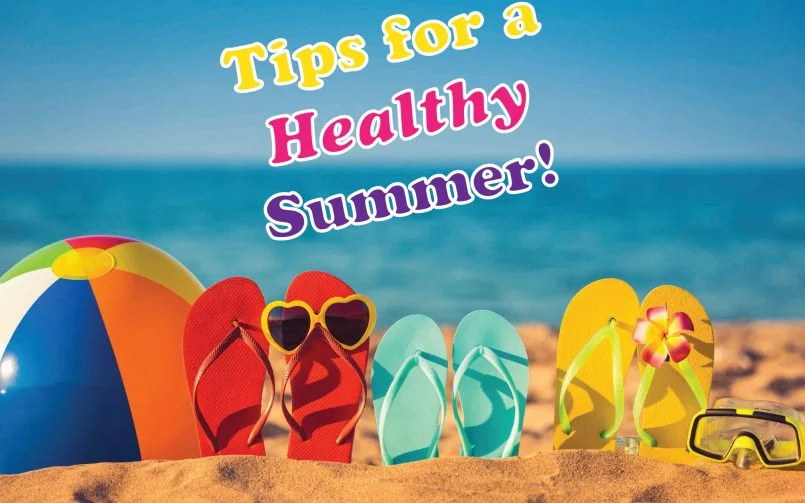The Summer Season is often accompanied by a plethora of health problems which can be prevented as well as treated with the right measures.
Here are some common health concerns of this season that you should remember and take precautions:
Heat Stroke is a serious kind of hyperthermia that is triggered when the human body absorbs more heat than it can dissipate.
In managing heat stroke, it is very important to bring down the body’s temperature as soon as possible. Switch on the air conditioner or take a cold shower.
Stay hydrated, avoid physical exertion and wear lose/light-shaded clothes
Skin allergies and rashes are very common during summer season. Prickly heat is a bacterial infection that is triggered by excess accumulation of sweat on a certain part of the skin. It mainly affects the neck & back region
Applying medicated talcum powder to the affected areas. Wear loose clothing and take cold showers twice a day. Keep the infected area dry & clean.
Sun burn and tanning occurs due to direct exposure of the sun. Ultra-violet ray burns the skin, resulting in dark patches leading to sun burns.
It is better to avoid direct exposure to sun rays especially during summers, between 10:00 am to 4:00 pm. Make a paste from 6 peeled cucumber juice, 2 cups of powdered milk and 2 teaspoons of dried lavender powder. Apply this paste to the tanned skin. Use a good quality sunscreen with SPF30+ is essential when you are moving out in the sun. Best is to avoid direct sunlight.
Heat cramps and exhaustion occur in the form of muscle pain/spasms and can be a result of strenuous physical activity during the summer time. Heat Exhaustion symptoms include excessive sweating followed by weakness, nausea, dizziness, muscle cramps, headache and even fainting
Relax your muscles and rest in a cool place. Consume electrolyte-enriched drinks. Even after the cramps subside, wait for some time before getting back to the strenuous activity in order to avoid heat exhaustion
Foot infection: Sweat and humidity often paves way for the build-up of bacteria on the feet, leading to infection during summer
Apply a good quality anti-bacterial powder to the affected area. Make sure to scrub your feet properly while taking a shower. This will help you get rid of the bacteria
Dehydrationis a physical state wherein the body almost stops sweating. Symptoms of dehydration also include muscle cramps, feeling of nausea, palpitations and light-headedness
Always keep water handy before you move out in the sun. If dehydration is accompanied by fever, visit your physician.
Asthma attacks:Summer can be a dangerous time for kids and adults with asthma. More smog and air pollution, high pollen levels and increased mould growth due to high humidity all cause a spike in asthma attacks.
Swimmer’s Ear: Infection due to swimming very common during the summer months in the outside of the ear as well middle ear infections. Ear care is especially important during the summer months when heat and humidity can fuel the growth of the bacteria and fungi that can cause swimmer’s ear.
Food Poisoning is also very common as during summer season perishable items tend to get spoilt due to the heat and can cause bacterial growth leading gastrointestinal infections. Keep food items well refrigerated and avoid keeping it out in the open. Wash all fruit and vegetables before consumption.
Insect bites and infection due to insects is also very common during the summer season. Better to apply insect repellents when outdoors as prevention.
In case of any health concern during the summer time please visit Wockhardt hospital for further treatment and management.




